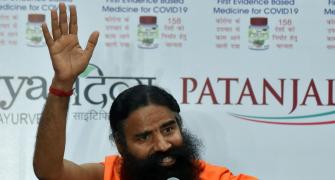The policy denying foreign companies automatic approval for new projects if they have a joint venture in India vitiates against an investment-friendly environment. But shareholders and promoters of the old venture also need to be considered.
Amit Mitra, Secretary-General, Ficci
"Press Note 18, issued on December 14, 1998, corrected a serious policy anomaly that could have ruined the future of many small shareholders, weakened some major financial institutions and brought disaster to hundreds of Indian private promoters.
"The simple issue is, if a foreign direct investor or technology collaborator had formed a joint venture with an Indian partner under whose leadership a great brand name was created, shareholders garnered and financial institutional loans generated, can the multinational simply walk away and form a 100 per cent equity company of its own through the new policy of the 'automatic FDI route', leaving the Indian company in the lurch?
"Suppose Honda were to walk away from Hero overnight and stop the supply of technology while creating its solely-owned Honda, what would happen to the shareholders of the Hero Honda brand? What would happen to the loans from financial institutions like IDBI, IFCI and ICICI? And what would happen to the promoters of Hero (-Honda) in the future?
"Similarly, imagine Suzuki walking away from TVS overnight because 100 per cent equity has been allowed in that sector. Many such success stories of joint ventures would be ruined in a jiffy.
"All that Press Note 18 did is to require the foreign company to go to the Foreign Investment Promotion Board and give details of the circumstances under which it would like to part company and start a new joint venture or wholly owned company or form a new partnership for technology transfer, including trade marks.
"The FIPB would then play the role of an arbitrator and could require the foreign company to seek a 'no objection' certificate from the original Indian partner. In this context, if we look at the case of Hero Honda or TVS Suzuki, we find that they reached amicable settlements within an orderly transition process with a win-win option for both.
In recent times, we saw the government play a very effective honest broker's role in the case of TVS Suzuki, with no rent-seeking or promoting any private angle. This was precisely the intent of Press Note 18 and it happened almost ideally. I recall the trauma of the parting of ways between Kinetic and Honda since there was no Press Note 18 at that time and Kinetic suffered on all of the above counts, understandably.
"The case could be similar for ITC and BAT. If BAT were to start a 100 per cent equity company in exactly the same line of business, it would have serious repercussions on the operations of ITC.
"In the same vein, we can look at the case of Pfizer. To take advantage of the 100 per cent equity automatic route, Pfizer Global started its own 100 per cent company in India to bring in the latest drugs in the higher ends of the pharmacological chain.
"This move has already brought down the Pfizer India share value and with it, the tell-tale signs of trouble. If intellectual property rights is the concern of Pfizer Global, it could have waited till December 31, 2004 by which time, India will have shifted totally to the product patent regime.
"One may ask why the equivalent of Press Note 18 does not exist in developed countries. The answer is simple. The western commercial joint ventures studied by Ficci invariably include a conflict-of-interest clause that prevents such sudden let-downs.
"Such contracts often include a three-year cooling period, even after parting of ways in an orderly manner, so that the brand name (trade mark) created by the joint venture cannot be instantaneously exploited by the newly-formed company.
"Unfortunately, such commercial contracts were not in vogue when joint ventures between Indian promoters and multinationals were formed. Multinationals were able to push through a non-exclusivity clause in technology transfer which kept the window open for a 100 per cent equity company.
"For joint ventures that have already floundered and remain in abeyance operationally where the Indian promoters are not in a position to perform their rightful duties, the foreign joint venture partner must have the right to start a 100 per cent equity company or their own technology transfer arrangements with others."
Pallavi Shroff, Partner, Amarchand Mangaldas
"Press Note 18 contradicts the Indian government's promise to create a 'foreign investment' friendly environment in India. To put it in a nutshell Press Note 18: (a) restricts the foreign investor's right to do business; (b) seeks to legislate on matters that are within the contractual domain; (c) creates an unequal and disadvantageous position for foreign investors; and (d) raises a plethora of legal and interpretational issues.
Press Note 18 denies the automatic approval route to a foreign investor proposing a new venture in India if the foreign investor 'has' or 'has had' any existing or previous joint venture or technology transfer agreement or trademark licensing in the same or allied field in India.
In this case, the foreign investor has to apply to the Foreign Investment Promotion Board/Project Approval Board for approval and the onus of proving that the new proposal would not, in any way, jeopardise the interest of the existing Indian partner, rests with the foreign investor.
A 'venture' for the purposes of Press Note 18 is wide enough to cover joint ventures, technology transfers and trademark licences.
Unfortunately, the sweeping effect of Press Note 18 is that even where a venture has been terminated, a foreign investor with a new proposal to invest in the same or allied field with a new partner in India, would be disentitled for the automatic route and would have to approach FIPB/PAB for approval for the new venture.
"Foreign investors with existing ventures in India have to prove that a new proposal would not in any way jeopardise that venture's interests.
"From practice, it appears that the only way this can be proved is by way of a no-objection certificate from the Indian partner. Needless to mention this no-objection certificate has become a weapon in the hands of the Indian partner.
"The Indian partner uses it mercilessly to extract greater exit value or challenge termination which is otherwise legally and contractually valid. Press Note 18 clearly restricts a foreign investor's right to do business and denies it the equal footing and treatment that it ought to be assured by the government.
"Another objection to Press Note 18 is that it seeks to cover an area that can easily be resolved between competent contracting parties. If the parties have agreed to an exclusive arrangement, then it should be respected and left to the commercial understanding of the parties.
"For breach of contractual provisions between parties, well-defined remedies are available in law and these remedies may be recoursed. This is not an area that requires special government intervention favouring the Indian partners.
"The requirement of obtaining a no-objection certificate from the Indian partner is a controversial area. This is also applicable where contractually the parties may have agreed to a non-exclusive arrangement. Often Indian partners agree to non-exclusivity with the mindset that they can take shelter under Press Note 18.
"The Indian partner, despite contracting otherwise, may refuse to give the foreign partner a 'no objection certificate', in which case, there is very little that the foreign partner can do, except maybe take recourse of the courts for specific performance.
Press Note 18 has also created problems with franchise transactions. Franchise arrangements by their very nature require execution of multiple trademark licences and technology transfer agreements. It may be argued that to avoid the rigors of Press Note 18 in the franchising industry, the foreign entity may sub-license the technology and trademark to an Indian entity and the Indian entity may thereupon appoint the franchisees.
But sub-licensing does not best protect the proprietary rights of a proprietor. Hence foreign proprietors would prefer executing trademark licences directly in favour of each licensee. Press Note 18 restricts this basic business requirement.
Press Note 18 is clearly outdated, contrary to the principles of freedom of contract and archaic in the present economic scenario. It is in the government's best interest to repeal it. This will be consistent with the government's policies of encouraging foreign investment across various industries in India.







